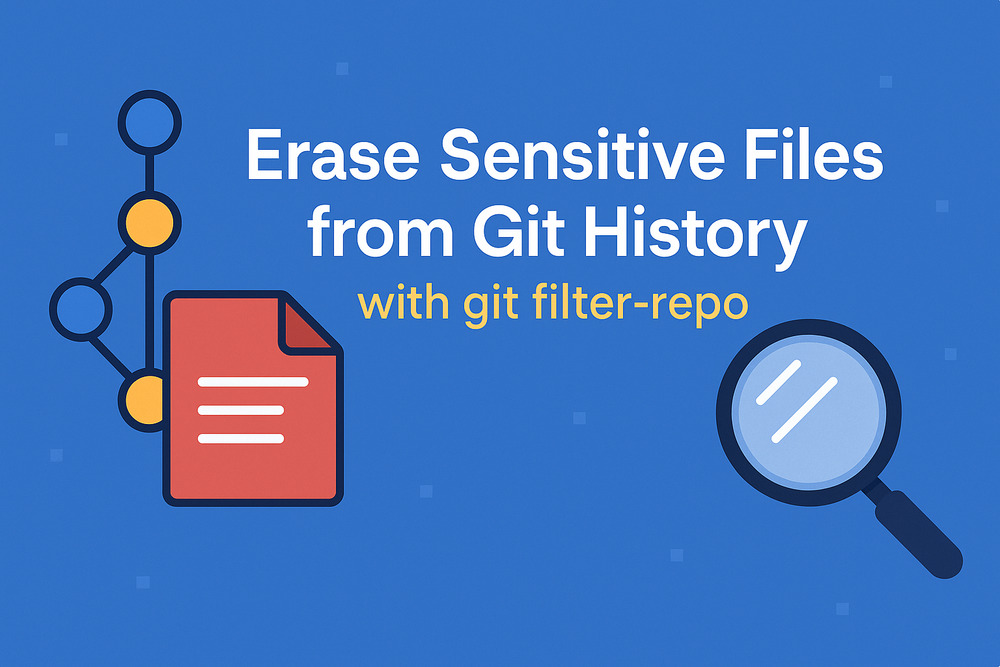23 Jun 2025
Ever accidentally commit a password to Git? You’re not the only one.
Last weekend, while working on a Rails project, I accidentally added my database.yml file to the repo and pushed it to GitHub. It contained my local MySQL password. No public exposure thankfully, but it still nagged at me. I didn’t want that file, or its contents, lingering in my Git history.
More …
17 Jun 2025
Getting a Rails application running on a remote server involves a fair bit of setup. Recently, I’ve had to go through the process a couple of times—provisioning a virtual machine, installing and configuring Apache, MySQL, Ruby, and Rails, and finally deploying the app. To make future deployments easier (and to have something to refer back to), I decided to document the steps.
More …
02 Jun 2025
This is a tutorial on how to set up authentication (verifying who you are) and authorization (what you’re allowed to do) in a Ruby on Rails app using Devise and CanCanCan. We’ll use Rails 8 and Ruby 3.4, and build everything locally—no external auth services required.
The code for this tutorial is on GitHub: https://github.com/hibbard-eu/authentication-with-devise-and-cancancan
More …
17 May 2025
In this post I’ll show you how to install Ubuntu Server 24.04 LTS (Jammy Jellyfish) on Oracle’s VirtualBox. I’ll also demonstrate how to connect to the Ubuntu instance via SSH, as well as how to run VirtualBox in headless mode.
Let’s get started!
More …
19 Jan 2025
Yesterday, I upgraded from Linux Mint 22 to 22.1 Xia using the Update Manager. The process was smooth enough, but having upgraded my .xsession-errors file started filling up with Gjs-CRITICAL errors.
Here’s how I solved the problem.
More …
01 Nov 2024
Mozilla recently launched Thunderbird Mobile for Android, and I was eager to give it a try. However, I am running Linux Mint 21.3, and installing Thunderbird from the repositories means you’re stuck with version 115.x, which doesn’t include the “Export to Mobile” feature. This is only available as of Thunderbird Desktop 128.4.0 or Thunderbird Beta 132 and newer.
Manually setting up my many email accounts on mobile wasn’t something I wanted to deal with. Instead, I downloaded a newer portable version of Thunderbird, used that to export my settings to the mobile app, and then reverted to my distro’s ESR release. This post explains how you can do the same.
More …
19 Jul 2024
When using Advanced Custom Fields (ACF) to manage taxonomy terms in a WordPress custom post type, the selected terms often appear in the order they were added rather than alphabetically.
This can be frustrating, especially when dealing with a long list of terms. Without a clear order, finding the right term at a glance can become a little tricky.
Luckily, we can hook into ACF’s filters to modify how the terms are loaded and ensure they are sorted alphabetically.
More …
21 Jun 2023
Manually backing up databases can be a frustrating and time-consuming task. It often involves logging into servers, managing credentials, transferring files, and keeping track of schedules to avoid missed backups.
In this post, I’ll walk you through the steps I took to create an automated solution for weekly MySQL backups. It involves setting up a cron job to run the backup at regular intervals, then emailing it to myself for easy access.
More …
01 Apr 2022
Most web applications need to persist data in one form or other. When working with a server-side language, this is normally a straightforward task. However when you add a front-end JavaScript framework to the mix, things start to get a bit trickier.
In this tutorial I am going to demonstrate how to build a JSON API using Ruby on Rails and then code a fully-functional React frontend to interact with the API. The app we’ll be building is an event manager, which will let you create and manage a list of academic events.
The app will showcase basic CRUD functionality and will add a couple of extra features, such as a datepicker and search.
More …
06 Feb 2022
Sometimes, without warning, your .xsession-errors file will grow to an enormous size. This can be inconvenient at best, or crash your operating system at worst.
In this post I explain how you can set up a cron job to automatically watch the file and get notified if it exceeds a certain size.
More …
